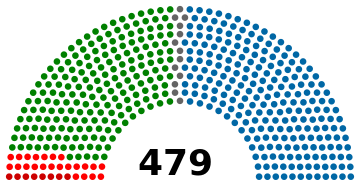| |||||||||||||||||||||||||||||||||||||||||||
| Chamber of Deputies | |||||||||||||||||||||||||||||||||||||||||||
479 seats in the Chamber of Deputies 240 seats needed for a majority | |||||||||||||||||||||||||||||||||||||||||||
| |||||||||||||||||||||||||||||||||||||||||||
| Senate | |||||||||||||||||||||||||||||||||||||||||||
25 seats in the Senate | |||||||||||||||||||||||||||||||||||||||||||
| |||||||||||||||||||||||||||||||||||||||||||
| This article is part of a series on the |
| Politics of Brazil |
|---|
 |
Executive
|
| Legislative |
Judiciary
|
| Law |
| Administrative divisions |
|
Elections
Recent elections |
Foreign relations
|
| Related topics |
Parliamentary elections were held in Brazil on 15 November 1982. The elections were conducted under the Military dictatorship in Brazil. Massive popular street demonstrations led the military dictatorship to stage the elections.
The pro-government Democratic Social Party (the successor of the ruling National Renewal Alliance) won 235 of the 479 seats in the Chamber of Deputies and 15 of the 25 seats in the Senate. Voter turnout was 82% for the Chamber of Deputies and 83% for the Senate.
Electoral system
Due to the growing popularity of the opposition Brazilian Democratic Movement, the ruling National Renewal Alliance Party passed electoral reforms in 1979, replacing the two-party system in place since 1965 with a multi-party system.
Results
Chamber of Deputies
 | |||||
|---|---|---|---|---|---|
| Party | Votes | % | Seats | +/– | |
| Democratic Social Party | 17,775,738 | 43.22 | 235 | +4 | |
| Brazilian Democratic Movement Party | 17,666,773 | 42.96 | 200 | +9 | |
| Democratic Labour Party | 2,394,723 | 5.82 | 23 | New | |
| Brazilian Labour Party | 1,829,055 | 4.45 | 13 | New | |
| Workers' Party | 1,458,719 | 3.55 | 8 | New | |
| Total | 41,125,008 | 100.00 | 479 | +57 | |
| Valid votes | 41,125,008 | 84.87 | |||
| Invalid/blank votes | 7,330,871 | 15.13 | |||
| Total votes | 48,455,879 | 100.00 | |||
| Registered voters/turnout | 58,871,378 | 82.31 | |||
| Source: Nohlen | |||||
Senate
| Party | Votes | % | Seats | |
|---|---|---|---|---|
| Brazilian Democratic Movement Party | 18,410,338 | 43.67 | 9 | |
| Democratic Social Party | 17,799,069 | 42.22 | 15 | |
| Democratic Labour Party | 2,496,188 | 5.92 | 1 | |
| Brazilian Labour Party | 1,909,452 | 4.53 | 0 | |
| Workers' Party | 1,538,786 | 3.65 | 0 | |
| Total | 42,153,833 | 100.00 | 25 | |
| Valid votes | 42,153,833 | 86.48 | ||
| Invalid/blank votes | 6,592,970 | 13.52 | ||
| Total votes | 48,746,803 | 100.00 | ||
| Registered voters/turnout | 58,871,378 | 82.80 | ||
| Source: Nohlen | ||||
References
- Dieter Nohlen (2005) Elections in the Americas: A data handbook, Volume II, p173 ISBN 978-0-19-928358-3
- Mun̄iz, Blanca P. (1983-12-01). "Brazilian elections 1982: The ambivalent legacy of varguism". Electoral Studies. 2 (3): 207–227. doi:10.1016/S0261-3794(83)80029-8. ISSN 0261-3794.
- Nohlen, p175
- Nohlen, p166
| Presidential elections | |
|---|---|
| Parliamentary elections | |
| Gubernatorial elections | |
| State elections | |
| Municipal elections | |
| Regency elections | |
| Referendums | |